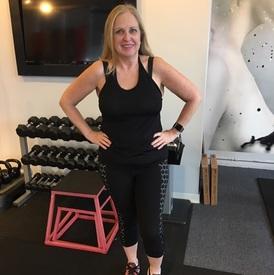Do you look at calories or Ingredients??
Replies
-
I do the opposite.0
-
crzycatlady1 wrote: »Happyhealthy08 wrote: »crzycatlady1 wrote: »I don't think I've ever run across a food that has questionable ingredients, so not quite sure what you mean there? When I look at nutrition labels I compare calories to grams, meaning how many calories a serving is.
I did type "rubbish" firstly but ingredients such as aspartame and in general ingredients you cannot recognise
But there's nothing wrong with aspartame and I do know what it is.
Someone on my Facebook feed once posted a macro to the effect of "If you don't buy things because you don't recognize the ingredients, you need to learn the names of more ingredients."
Personally I don't buy "thin bread" or Lean Cuisine tv dinners or fat-free cookies because they look disgusting and I'm a picky eater. I'm not eating food-flavored product just because it's devoid of calories.3 -
I concentrate on calories and then macros. But I also largely focus on whole foods.. but is definitely 4 different types of jelly beans, Cadbury eggs, ice cream, toaster strudel and 2-3 diet mt. dews in my diet daily.
I have lost 50lbs + at this point, gotten down to about 15% body fat, and improved every single metabolic marker possible.2 -
I do follow the rule that if I can't pronounce it I don't eat it, but I took 4 years of Latin and 2 years of Greek in high school, so I haven't run across anything I couldn't eat yet.13
-
Larissa_NY wrote: »crzycatlady1 wrote: »Happyhealthy08 wrote: »crzycatlady1 wrote: »I don't think I've ever run across a food that has questionable ingredients, so not quite sure what you mean there? When I look at nutrition labels I compare calories to grams, meaning how many calories a serving is.
I did type "rubbish" firstly but ingredients such as aspartame and in general ingredients you cannot recognise
But there's nothing wrong with aspartame and I do know what it is.
Someone on my Facebook feed once posted a macro to the effect of "If you don't buy things because you don't recognize the ingredients, you need to learn the names of more ingredients."
Personally I don't buy "thin bread" or Lean Cuisine tv dinners or fat-free cookies because they look disgusting and I'm a picky eater. I'm not eating food-flavored product just because it's devoid of calories.
Thin bread = bread that is sliced thinner to be fewer cals per slice. What is wrong with that?5 -
I don't believe artificial sweeteners are "questionable". I want thin-sliced bread, or half of a fat slice. Lean Cuisine makes some delicious and healthy meals. Seems kind of logical to me.2
-
Since I rarely buy pre-processed foods, I would look at ingredients. I normally eat vegetables, fruit and fish or low-fat meat. I had some pre-packaged potatoes last night, but they have potatoes in them.
I don't buy food that I can't read or understand what an ingredient is. If it isn't natural, I am not going to eat it.
Low fat and non-fat food has other stuff you don't need. Substitute sugar is really bad for you.
To each, his or her own though.0 -
I mostly eat whole foods that don't have labels, but I read the full label and ingredients when buying packaged foods. I buy some low cal, fat free or 'diet' foods and some not.0
-
The first thing I base my meal around is protein, then vegetables. I don't have too many ingredients to consider. I eat some lower calorie things like laughing cow cheese and halo top, but the ingredients don't bother me as at least 80% of my diet comes from whole foods.1
-
I read all ingredients and serving sizes. Always have, for health but I also just find it interesting. I try to avoid modified sugars in my packaged food, although most of what I eat I make from scratch. I also haven't found an artificial sweeter I can tolerate the taste of, so I will pick a Pepsi throwback over a Diet drink. Not to say that Pepsi is remotely healthy for me. So, I do read everything and make it a point to understand what I am consuming, but I also still make plenty of "unhealthy" choices. I try not to stress about it, and at times I find the joy of eating "unhealthy" food totally worth it.0
-
Only look at Macros and how they will fit in my daily numbers. Macros obviously add up to your calories, but there you have it.0
-
I first look at calories, but then I look at carbs and sugar content. Lastly, I have to double check everything for artificial sweeteners, as I'm severely intolerant of them and prefer not to have a surprise migraine.0
-
Anything new, I generally take a pretty good look at the nutrition label as a whole. Whether or not I get it depends on what it is, and then the calories, macros, ingredients. For example, yogurts that have sweeteners, I tend to stay away from, because I know i'm not going to like the aftertaste.0
-
Larissa_NY wrote: »crzycatlady1 wrote: »Happyhealthy08 wrote: »crzycatlady1 wrote: »I don't think I've ever run across a food that has questionable ingredients, so not quite sure what you mean there? When I look at nutrition labels I compare calories to grams, meaning how many calories a serving is.
I did type "rubbish" firstly but ingredients such as aspartame and in general ingredients you cannot recognise
But there's nothing wrong with aspartame and I do know what it is.
Someone on my Facebook feed once posted a macro to the effect of "If you don't buy things because you don't recognize the ingredients, you need to learn the names of more ingredients."
Personally I don't buy "thin bread" or Lean Cuisine tv dinners or fat-free cookies because they look disgusting and I'm a picky eater. I'm not eating food-flavored product just because it's devoid of calories.
To each their own-I like LCs and thin breads (which is literally bread that's just cut into thin slices), etc. I don't eat 'food-flavored products', I eat the foods that I like and also help me reach my goals 3
3 -
nickiphillips1 wrote: »Since I rarely buy pre-processed foods, I would look at ingredients. I normally eat vegetables, fruit and fish or low-fat meat. I had some pre-packaged potatoes last night, but they have potatoes in them.
I don't buy food that I can't read or understand what an ingredient is. If it isn't natural, I am not going to eat it.
Low fat and non-fat food has other stuff you don't need. Substitute sugar is really bad for you.
To each, his or her own though.
Citation please.1 -
I don't buy special diet food. I primarily use whole foods and minimally processed foods. I don't eat much of what I would consider heavily processed foods...on the occasion that I do, I'm not particularly worried about it.1
-
Both, and then some. I'm in this more for health benefits rather then weightloss, so what I put in my body is just as important as how much I shovel in.1
-
I look at ingredients first. If I don't like what is in it I don't eat it or serve it to my family.0
-
I compare nutrition labels and buy what fits best with my goals. If I don't like it, then next time I buy whatever came in 2nd place. Since I have no food intolerances or allergies, I have no reason to ban any ingredients.0
-
Larissa_NY wrote: »crzycatlady1 wrote: »Happyhealthy08 wrote: »crzycatlady1 wrote: »I don't think I've ever run across a food that has questionable ingredients, so not quite sure what you mean there? When I look at nutrition labels I compare calories to grams, meaning how many calories a serving is.
I did type "rubbish" firstly but ingredients such as aspartame and in general ingredients you cannot recognise
But there's nothing wrong with aspartame and I do know what it is.
Someone on my Facebook feed once posted a macro to the effect of "If you don't buy things because you don't recognize the ingredients, you need to learn the names of more ingredients."
Personally I don't buy "thin bread" or Lean Cuisine tv dinners or fat-free cookies because they look disgusting and I'm a picky eater. I'm not eating food-flavored product just because it's devoid of calories.
Thin bread = bread that is sliced thinner to be fewer cals per slice. What is wrong with that?
In the post you quote I said I'm a picky eater, remember? I don't want to eat bread that looks like it's going to fall apart the minute I try to put something on it. If I'm going to eat sliced bread, which I usually don't, I don't want it to fall apart when I pick it up off the plate.
It may be that thin bread doesn't fall apart and get condiments everywhere; I don't know and I don't care. It's enough for me that it looks like it's going to.0 -
I base my diet on foods I want to eat; foods that are delicious and satiating. That eliminates ultra processed foods for me so ingredients aren't an issue. Which leaves calories and those I regulate with good food habits.
Choosing food for reasons other than taste and satiety has never been sustainable for me.1
This discussion has been closed.
Categories
- All Categories
- 1.4M Health, Wellness and Goals
- 398.5K Introduce Yourself
- 44.7K Getting Started
- 261K Health and Weight Loss
- 176.4K Food and Nutrition
- 47.7K Recipes
- 233K Fitness and Exercise
- 462 Sleep, Mindfulness and Overall Wellness
- 6.5K Goal: Maintaining Weight
- 8.7K Goal: Gaining Weight and Body Building
- 153.5K Motivation and Support
- 8.4K Challenges
- 1.4K Debate Club
- 96.5K Chit-Chat
- 2.6K Fun and Games
- 4.8K MyFitnessPal Information
- 18 News and Announcements
- 21 MyFitnessPal Academy
- 1.5K Feature Suggestions and Ideas
- 3.2K MyFitnessPal Tech Support Questions
















